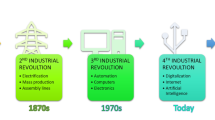Abstract
Through the use of Internet of Things technology, users and suppliers can be freely matched, and their idle resources can be traded in the display world to improve product utilization. A sharing economy means that organizations or individuals with idle resources transfer the right to use these resources to others for rewards; thus, sharers create value by sharing their idle resources with others. However, the development time of the sharing economy is short, and the entire development model has shortcomings. This paper aims to study innovation research on the sharing economy supervision mode based on mobile information systems. It links the mobile information system with the sharing economy model and regulates the sharing economy development model. A mobile information system is a model that reflects the internal structure of an information system and the connections between its parts. It generally refers to the structural model of an information system; thus, it is usually represented by a structural diagram. This paper proposes a theoretical analysis framework based on mobile information systems, which provides a theoretical basis for the exploration of the sharing economy. Starting from the intersection of supervision, this paper first discusses the rationality of the implementation of internet sharing economy supervision and points out the problems that exist in the development of the sharing economy. The test results of this paper show that only 18% of people think that the price of online car-hailing is high, and only 7.7% of people think that the price of online car-hailing is very high; these results indicate that the current price of shared transportation needs to be increased.








Similar content being viewed by others
Data availability statements
Data sharing is not applicable to this article as no datasets were generated or analyzed during the current study.
References
Ciulli F, Kolk A (2019) Innovation of existing firms and business models in the sharing economy: implications for sustainability. J Clean Prod 214(MAR.20):995–1010
Münzel K, Boon W, Frenken K (2018) German car sharing business model: characteristics, success and future prospects. Inf Syst E-Commer Manag 16(2):271–291
Acquier A, Daudigeos T, Pinkse J (2017) The promise and paradox of the sharing economy: an organizational framework. Technol Forecast Soc Change 125(Dec.):1–10
Lombardi P, Schwabe F (2017) Sharing economy as a new business model for energy storage systems. Appl Energy 188(February 15):485–496
Munoz P, Cohen B (2017) Mapping the sharing economy: a configuration approach to sharing business modeling. Technol Forecast Soc Change 125(Dec.):21–37
Qi J (2021) Research on mobile learning of teaching information service system based on big data-driven environment. Educ Inf Technol 26(5):6183–6201
Jun L, Bin P, Xin Z (2021) Mobile e-commerce information system based on industrial clusters under edge computing. Mob Inf Syst 2021(1):1–11
Zhang J, Xiao J, Wan J (2017) A parallel strategy for mobile information systems based on heterogeneous clusters. Mob Inf Syst 2017(Part 2):1–12
Rosewell A, Shearman P, Ramamurthy S (2021) Transforming health information systems with mobile and geographic information technologies, Papua New Guinea. Bull World Health Organ 99(5):381-387A
Zheng Xu, Zhu G, Metawa N, Zhou Q (2022) Machine learning based customer meta-combination brand equity analysis for marketing behavior evaluation. Inf Process Manag 59(1):102800
Jiang Y (2022) Prediction model of the impact of innovation and entrepreneurship on China’s digital economy based on neural network integration systems. Neural Comput Appl 34:2661–2675
Richter C, Kraus S, Brem A (2017) Digital entrepreneurship: innovative business models for the sharing economy. Creat Innov Manag 26(3):300–310
Buheji M, Ahmed D (2017) Creative destruction and sharing economy. Int J Youth Econ 1(1):119–120
Tuscher K, Kietzmann J (2017) Learning from the failure of the sharing economy. MIS Q Exec 16(4):253–263
Jehlička P, Daněk P (2017) Making the actual sharing economy visible: self-produced food and the joy of sharing. Rural Sociol 57(3):274–296
Teubner T, Hawlitschek F, Dann D (2017) Airbnb’s price determinants: how reputation pays off in the sharing economy. Econ Auton Manag 5(4):53–80
Author information
Authors and Affiliations
Corresponding author
Ethics declarations
Conflict of interest
Our paper presents no potential conflicts of interest, and all authors have reviewed the manuscript and approved submission to your journal. We confirm that the content of the manuscript has not been published or submitted for publication elsewhere.
Additional information
Publisher's Note
Springer Nature remains neutral with regard to jurisdictional claims in published maps and institutional affiliations.
Rights and permissions
Springer Nature or its licensor (e.g. a society or other partner) holds exclusive rights to this article under a publishing agreement with the author(s) or other rightsholder(s); author self-archiving of the accepted manuscript version of this article is solely governed by the terms of such publishing agreement and applicable law.
About this article
Cite this article
Wang, S. Theoretical analysis framework of a shared economy supervision and management model using mobile information system data. Neural Comput & Applic (2022). https://doi.org/10.1007/s00521-022-07831-z
Received:
Accepted:
Published:
DOI: https://doi.org/10.1007/s00521-022-07831-z



